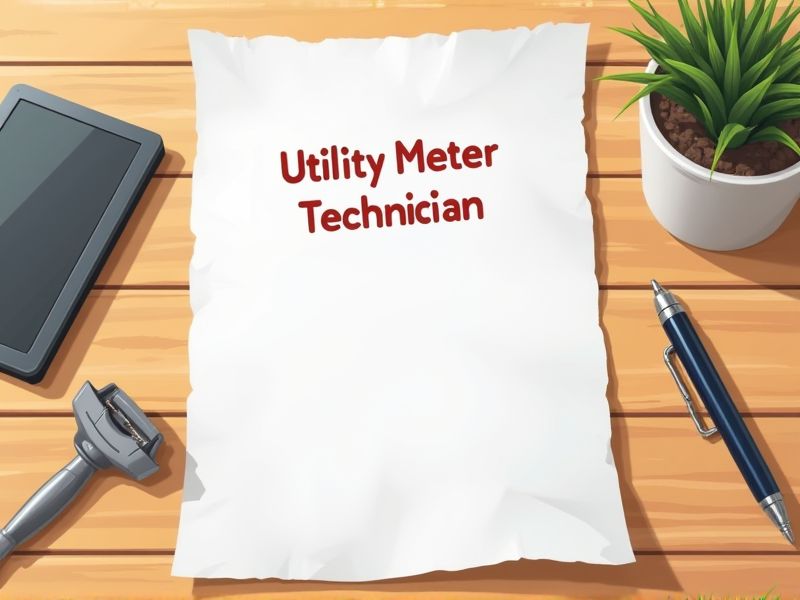
Utility Meter Technicians handle the installation and maintenance of electricity, gas, or water meters, which requires a high level of technical skill and precision. Certain certifications ensure they have the necessary knowledge to safely and accurately work with various meter types and technologies. These certifications also serve to validate their expertise and compliance with industry standards. Here are some important certifications you may need in this field.
Certified Meter Technician (CMT)
Utility companies require Certified Meter Technicians because certified professionals demonstrate the ability to accurately install, maintain, and repair complex metering systems, ensuring operational efficiency. Accurate metering directly affects billing and revenue, making certification critical to avoid costly errors. Certified technicians are trained to adhere to industry standards and regulations, minimizing the risk of non-compliance penalties. Certification reflects a commitment to safety and technical proficiency, reducing accident probabilities and improving service reliability.
Advanced Metering Infrastructure (AMI) Certification
Advanced Metering Infrastructure (AMI) Certification is necessary for utility meter technicians as it ensures they're equipped with the skills to effectively manage and troubleshoot modern smart meters. Certified technicians can efficiently install and maintain AMI systems, leading to enhanced accuracy in billing and energy consumption data. Certification also boosts a technician's credibility and trustworthiness, which is crucial for customer satisfaction and adherence to industry standards. The certification process helps technicians stay updated with the latest technological advancements and regulatory requirements in metering infrastructure.
National Electrical Code (NEC) Certification
The National Electrical Code (NEC) certification ensures that utility meter technicians adhere to established safety standards, reducing the risk of electrical hazards. Compliance with the NEC guarantees that technicians are knowledgeable about the most current codes and practices, which helps in maintaining system integrity and efficiency. This certification validates a technician's competence, fostering trust among employers and customers who rely on safe and precise metering. State regulations and utility companies often require NEC certification as a baseline for employment, reinforcing its importance in the industry.
Electrical Safety Certification (NFPA 70E)
Electrical Safety Certification, such as NFPA 70E, emphasizes reducing risk of electrical hazards, protecting utility meter technicians from burns, shocks, and electrocution. Utility meter technicians often work with high voltage equipment, making adherence to NFPA 70E critical for maintaining workplace safety standards. Compliance with NFPA 70E ensures technicians are trained in safe work practices, leading to fewer accidents and increasing operational efficiency. Certification also aligns with regulatory requirements, minimizing liabilities for utility companies.
OSHA 10-Hour Certification
The OSHA 10-Hour Certification is needed for Utility Meter Technicians to ensure they understand and adhere to the safety standards crucial for minimizing workplace hazards. Utility meter work often involves exposure to electrical hazards and confined spaces, making safety training a critical preventive measure. Certification highlights a technician's preparedness to handle emergencies effectively, reducing the risk of accidents and injuries. Employers benefit from decreased liability and enhanced safety records by ensuring their technicians are OSHA certified.
OSHA 30-Hour Certification
Utility meter technicians face various hazards, such as electrical risks and confined space environments. OSHA 30-Hour Certification provides comprehensive training on identifying and mitigating these dangers effectively. The certification enhances workplace safety, reducing the likelihood of accidents and their associated costs. Regulatory compliance is often mandatory for contractors, and having the certification helps meet these legal requirements.
Calibration Technician Certification
Calibration Technician Certification impacts the accuracy and reliability of measurements performed by Utility Meter Technicians. Proper certification ensures technicians are knowledgeable about industry standards and advanced calibration techniques. Lack of certification can result in erroneous readings, leading to billing discrepancies and regulatory non-compliance. Certification enhances professional credibility and opens pathways to career advancement in the utilities sector.
Smart Grid Technology Certification
Smart grid technology certification equips utility meter technicians with the knowledge to handle advanced metering infrastructure, which directly improves grid efficiency. Enhanced skills in smart grid systems enable technicians to accurately diagnose and fix issues, reducing downtime and operational costs. Certification ensures compliance with industry standards, which mitigates risk and enhances safety protocols. As energy grids evolve, certified technicians become critical in integrating renewable energy sources into existing infrastructures.
Utility Meter Installation Certification
Utility Meter Installation Certification ensures technicians have the proper knowledge to install meters safely and effectively, reducing the risk of errors and accidents. The certification provides assurance to utility companies that the technician is skilled, which helps maintain accuracy in energy billing. Certified technicians are familiar with regulations and standards, which promotes compliance and prevents legal issues for the utility provider. Having certified technicians increases consumer trust as it indicates reliability and professionalism in service delivery.
Industrial Instrumentation & Control Certification
Utility meter technicians need an Industrial Instrumentation & Control Certification because it ensures they are capable of accurately reading and configuring complex metering systems. Incorrect meter readings due to a lack of proper training can lead to billing discrepancies, affecting both consumers and utility companies financially. Certification provides standardized knowledge of automation and control systems, enhancing operational efficiency and safety. Meter technicians must stay updated with evolving technologies, and certification offers ongoing educational resources to adapt to industry innovations.
Summary
When you obtain certifications as a Utility Meter Technician, your job prospects likely improve as employers often prioritize certified candidates. Your credibility and trustworthiness in handling complex tasks may also increase, leading to enhanced job security. Certification could expand your skills, allowing you to tackle a wider range of utilities and technologies. This recognition might result in loftier positions or higher compensation due to the specialized expertise.
